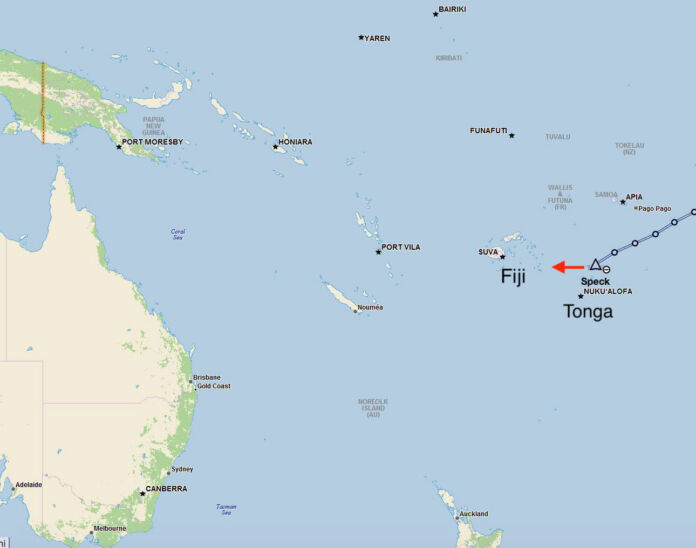Where is Tahiti in relation to Tonga?
Tahiti is 23h behind Tonga.
What island is closest to Tonga?
It is surrounded by Fiji and Wallis and Futuna (France) to the northwest; Samoa to the northeast; New Caledonia (France) and Vanuatu to the west; Niue (the nearest foreign territory) to the east; and Kermadec (New Zealand) to the southwest. Tonga is about 1,800 km (1,100 mi) from New Zealand's North Island.
Where is Tonga in relation to Fiji?
Tonga is two roughly parallel chains of around 170 islands in the south-western Pacific. Neighbouring countries include Fiji to the west, Cook Islands to the east and Samoa north.
Is Tonga in French Polynesia?
Polynesia (UK: /ˌpɒlɪˈniːziə/, US: /-ˈniːʒə/) is a subregion of Oceania, made up of more than 1,000 islands scattered over the central and southern Pacific Ocean
.Core area.
Where is Tonga from Bora Bora?
How far is it from Tonga to Bora-Bora? The distance between Tonga and Bora-Bora is 2505 km.
Why is Fiji not part of Polynesia?
As it did so, tensions between the Melanesian and Polynesian people grew and, ultimately, a significant number of the Lapita people chose, or were coerced, to leave Fiji and settle in locations further east, such as Tonga, Samoa and other islands which are today collectively known as Polynesia.
What race is Polynesian?
Polynesians are part of the Austronesian-speakers who migrated from Taiwan and crossed to the Pacific through the Philippines, eastern Indonesia, New Guinea, and Melanesia. Analysis of the Polynesian DNA has shown that the Polynesian people are closely related to East Asians, Micronesians, and Taiwanese Aborigines.
Are Polynesians from Africa?
So, while the Polynesian mtDNA haplotypes belonging to the B4a1a1 lineages can ultimately be traced back to Southeast Asia, Polynesian origins lie in both Asia and Near Oceania.
Are Japanese related to Polynesians?
Not only is that the case, but the polynesian languages are not even in the proposed Altaic family, so the reality is that there is absolutely zero connection between native polynesian and native Japonic vocab. The vast majority of the rest of Japanese's vocab consists of loan words from classical chinese.
Where did the original Polynesians come from?
The direct ancestors of the Polynesians were the Neolithic Lapita culture, which emerged in Island Melanesia and Micronesia at around 1500 BC from a convergence of migration waves of Austronesians originating from both Island Southeast Asia to the west and an earlier Austronesian migration to Micronesia to the north.
Where did the Samoan race come from?
He says the study also found that modern Samoans come largely from the Austronesian lineage (people in Taiwan, Island Southeast Asia, Micronesia, coastal New Guinea, Island Melanesia, Polynesia, and Madagascar) and share only 24 percent of their ancestry with Papuans, the descendants of the people who settled Papua/New
.
Where did Pacific Islanders originate from?
Pacific Islanders originate from countries within the Oceanic regions of Polynesia, Melanesia, and Micronesia.
What race is Pacific Islander?
“Native Hawaiian and Other Pacific Islander” includes Native Hawaiian, Samoan, Guamanian or Chamorro, Fijian, Tongan, or Marshallese peoples and encompasses the people within the United States jurisdictions of Melanesia, Micronesia and Polynesia.
Which Polynesian country is the oldest?
Archaeological dating places Tonga as the oldest known site in Polynesia for the distinctive Lapita ceramic ware, at 2800–2750 years before present.
What is the oldest island in the Pacific?
Mangaia
Who were the first Pacific Islanders?
While the first settlers of the Pacific Islands are thought to have crossed over land from northern Australia to New Guinea at least 40,000 years ago, evidence for human movement east of the Solomon Islands originates with groups of master seafarers in southern China approximately 5,000 years ago.
Which ocean is the oldest?
The Pacific
How did humans reach Polynesia?
Pacific islands are so widely scattered that humans lived on them in genetic isolation, and travel between islands by canoe was necessarily undertaken by small groups of perhaps 30 to 200 individuals, who formed a very small founding population on each new island that they reached.
Why did Polynesians stop exploring?
They were able to construct impressive boats, and navigate the ocean using only stars and ocean currents to guide them. Yet they suddenly stopped sailing. Some of the theories put forth by researchers to explain the cause of The Long Pause include sustained El Nino winds and ocean disasters, such as tidal waves.
What language do Polynesians speak?
The best-known Polynesian languages are Samoan, with about 200,000 speakers; Maori, spoken in New Zealand by about 100,000 persons; Tahitian, with an unknown number of native speakers but widely used as a lingua franca in French Polynesia; and Hawaiian, with only a few remaining native speakers but formerly spoken by
What religion do most Pacific Islanders practice?
Christianity is the predominant religion in Oceania. This article gives an outline of various religions in Oceania in 2010 according to a 2012 Pew Research Center report
.Micronesia.
What are the traditional foods of the Pacific Islands?
Generally the main traditional staple foods eaten in the Pacific are root crops. These include the edible aroids or toros, yams, sweet potatoes and cassava. Other staples are energy~giving fruits such as breadfruit, banana and plantain, coconuts and pandanus.
Are Pacific Islanders indigenous?
In fact, 8 out of 10 Pacific Islanders in the country are Indigenous to the US-colonized territories, according to a report by a White House Initiative on Asian Americans and Pacific Islanders. These US-colonized islands are scattered across the Pacific Ocean's three regions — Melanesia, Polynesia, and Micronesia.
Do Pacific Islanders believe in God?
The people of the Pacific have been described as 'deeply religious', with most Islanders actively following a faith. The importance of religion and its institutions in the Pacific is marked by the extent of their involvement in all parts of island society, including services such as education and medicine.
Do most Hawaiians speak Hawaiian?
A creole language, Hawaiian Pidgin (or Hawaii Creole English, HCE), is more commonly spoken in Hawaiʻi than Hawaiian
.Hawaiian language.
